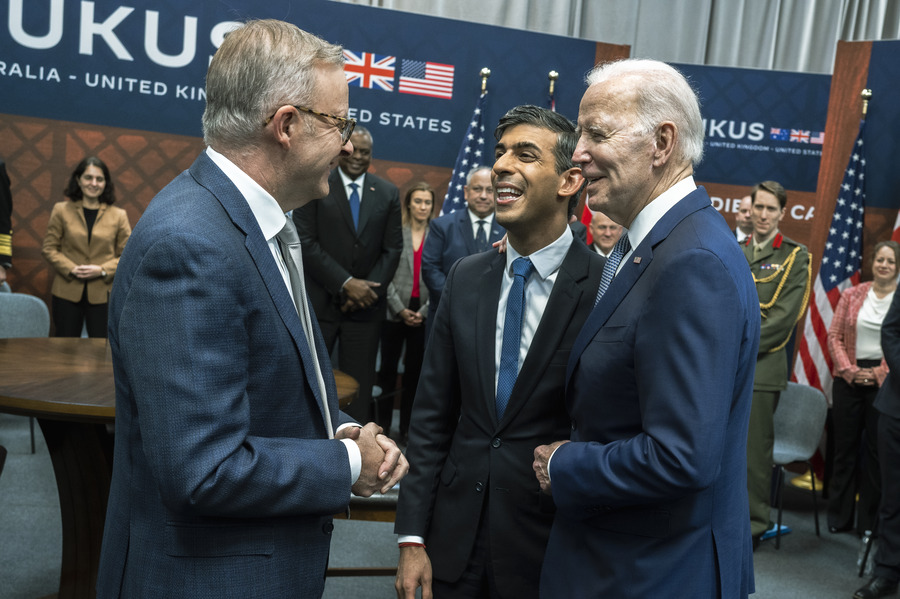Air Strikes and ISIS: A Quick Review of the Article II, 2001 AUMF, and 2002 AUMF Arguments
Today President Obama ruled out sending ground forces back into Iraq, but he pointedly did not rule out the direct use of U.S. air power in kinetic operations against ISIS. The President explained that he has directed his “national security team to prepare a range of other options that could help support Iraqi security forces.” And while those options will no doubt include the provision of financial, material, and ISR (“Intelligence, Surveillance, and Reconnaissance”) support for Iraqi forces, they are bound to also include the use of U.S.
Published by The Lawfare Institute
in Cooperation With

Today President Obama ruled out sending ground forces back into Iraq, but he pointedly did not rule out the direct use of U.S. air power in kinetic operations against ISIS. The President explained that he has directed his “national security team to prepare a range of other options that could help support Iraqi security forces.” And while those options will no doubt include the provision of financial, material, and ISR (“Intelligence, Surveillance, and Reconnaissance”) support for Iraqi forces, they are bound to also include the use of U.S. assets to conduct airstrikes directly (Iraqi forces having very little present capacity of their own in this respect).
I’m in no position to say whether airstrikes would be a good idea, but because that option might well be adopted soon (note that the USS George H.W. Bush, an aircraft carrier on station in the region, reportedly is moving towards the Persian Gulf at this moment) I’d like to share a few thoughts on what the most-likely domestic law justification for such operations might be.
Article II and the Libya Precedent
If airstrikes occur, I’m pretty sure the argument will be Article II and only Article II. As Jack noted earlier today, the Obama administration in 2011 determined that it had unilateral authority to conduct a sustained air campaign against Libyan government forces because (i) “the United States has a strong national security and foreign policy interest in security and stability in the Middle East that was threatened by Qadhafi’s actions in Libya,” and (ii) “the limited military operations the President anticipated directing were not a ‘war’ for constitutional purposes” (because they would be “limited in their nature, scope, and duration,” amounting solely to “airstrikes and associated support missions” but with no ground troops). That sounds exactly like what we might expect to see in Iraq against ISIS. Indeed, the argument about the strength of the national interest strikes me as far stronger in the current case. The only notable difference is the absence (at least for now) of a UN Security Council Resolution potentially authorizing the intervention. I don’t think that would stop the administration from taking the same position, however.
The AUMFs
Jack and Wells have debated the potential relevance of the 2002 Iraq AUMF here and here. I need to study the issue more closely, but currently I’m inclined to agree with Wells that the 2002 AUMF might not be an adequate fit.
And the 2001 AUMF linked to al Qaeda? Jen Daskal several months ago contended that the 2001 AUMF would not apply to ISIS given that al Qaeda’s “General Command” issued a statement in February declaring that it was cutting all ties to ISIS. So the 2001 AUMF does appear off the table for the moment. But note that the cut-off occurred because ISIS leader Abu Bakr al Baghdadi refused to obey Ayman al Zawahiri’s determination that ISIS should focus solely on Iraq, leaving Syria to al Nusrah. Intriguingly, though, just last month Zawahiri again urged ISIS to focus its attention on Iraq, and suggested that al Qaeda would in that case accept ISIS back into the fold. Given recent events, it is by no means inconceivable that we’ll soon here of an ISIS/al Qaeda reconciliation. Would the 2001 AUMF at that point instantly spring back into relevance, on the strength of a Zawahiri press release? Not exactly, I think, for if we are speaking in terms of an “associated force” then there would also need to be a showing of engagement in hostilities with the United States or its coalition partners. Would that be satisfied? Not as to the United States, at least not based on the public record as it stands at this moment. But ah that last clause...wouldn’t Iraq be a coalition partner in this context? Hard to see how it would not be, if we are bombing ISIS in support of Iraqi security forces. Of course, I could be wrong that the administration currently interprets the associated forces test to include coalition partners in this way.
Robert (Bobby) Chesney is the Dean of the University of Texas School of Law, where he also holds the James A. Baker III Chair in the Rule of Law and World Affairs at UT. He is known internationally for his scholarship relating both to cybersecurity and national security. He is a co-founder of Lawfare, the nation’s leading online source for analysis of national security legal issues, and he co-hosts the popular show The National Security Law Podcast.





